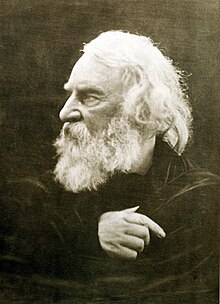Inside: From hearing Christmas bells to writing a poem, this lesser-known Christmas carol is appropriate for our times.

Hearing Christmas Bells: The Story Behind the Song
“I Heard the Bells on Christmas Day” isn’t one of the more common carols we hear this season, but the story behind this hymn is quite compelling. It starts with Henry Wadsworth Longfellow, poet and proud native son of Pilgrim ancestry. Our first American poet to receive widespread notoriety, he chose American history and traditions as his subjects, with such poems as “The Courtship of Miles Standish” and “Paul Revere’s Ride.”
His poem “Christmas Bells” was written after a particularly difficult period in his life. In 1861 his beloved wife and mother of their children was burned in a freak accident when her dress caught fire. She died a day later, leaving him a widower with five children to raise alone. In the spring of 1863, his son Charles left home, without Henry’s knowledge, to join the Union Army to fight in the Civil War. In December of that year word reached Longfellow that Charles had been severely wounded when a bullet entered through his left shoulder, traveled across his back, and exited under his right shoulder. He left immediately to bring his son home to nurse him back to health.
During what would have normally been a happy time, his heart was weary from the loss of his wife and so much death from a war which divided the country he so loved. In his deep despair he penned these words upon hearing the church bells ring on Christmas Day.
Christmas Bells
I heard the bells on Christmas Day
Their old, familiar carols play,
and wild and sweet
The words repeat
Of peace on earth, good-will to men!
And thought how, as the day had come,
The belfries of all Christendom
Had rolled along
The unbroken song
Of peace on earth, good-will to men!
Till ringing, singing on its way,
The world revolved from night to day,
A voice, a chime,
A chant sublime
Of peace on earth, good-will to men!
Then from each black, accursed mouth
The cannon thundered in the South,
And with the sound
The carols drowned
Of peace on earth, good-will to men!
It was as if an earthquake rent
The hearth-stones of a continent,
And made forlorn
The households born
Of peace on earth, good-will to men!
And in despair I bowed my head;
“There is no peace on earth,” I said;
“For hate is strong,
And mocks the song
Of peace on earth, good-will to men!”
Then pealed the bells more loud and deep:
“God is not dead, nor doth He sleep;
The Wrong shall fail,
The Right prevail,
With peace on earth, good-will to men.”
(Emphasis mine.)

Longfellow’s words seem especially appropriate this year, in particular the sixth and seventh stanzas.
Do you agree?
